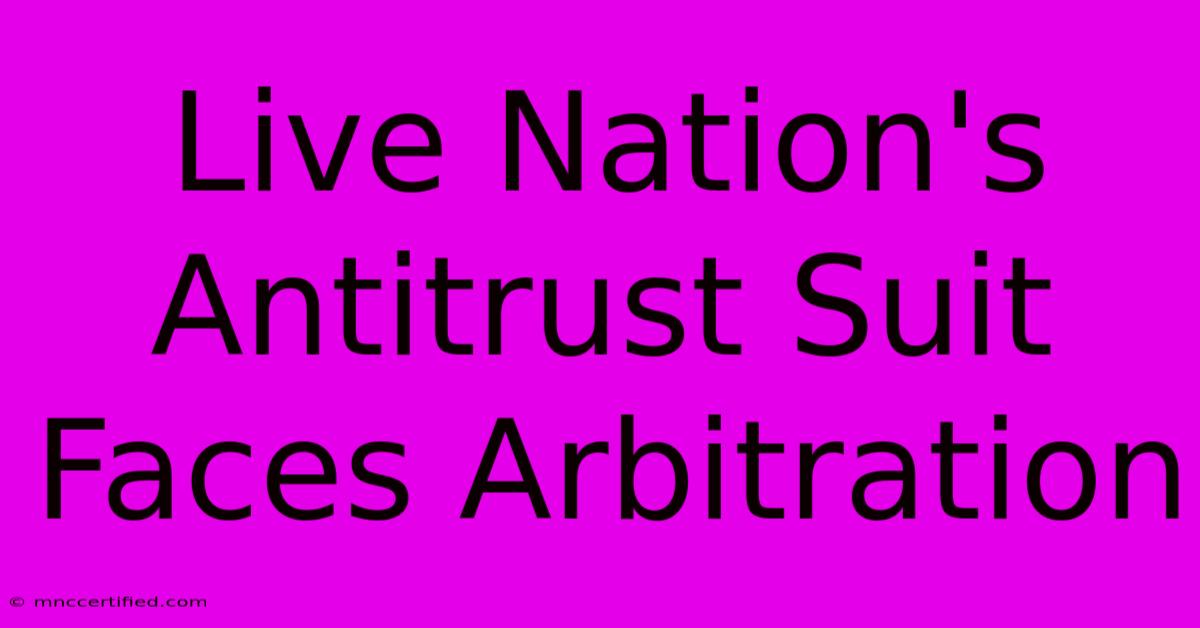Live Nation's Antitrust Suit Faces Arbitration

Table of Contents
Live Nation's Antitrust Suit Faces Arbitration: A Deep Dive into the Legal Battle
Live Nation Entertainment, the world's largest concert promoter, is facing a significant legal challenge: an antitrust lawsuit alleging monopolistic practices. This article delves into the intricacies of the case, exploring the allegations, the implications for the live music industry, and the shift towards arbitration.
The Antitrust Allegations Against Live Nation
The lawsuit, filed by [Insert Plaintiff Name(s) or type of plaintiff, e.g., several independent promoters and artists], accuses Live Nation of engaging in anti-competitive behavior that stifles competition and harms artists and consumers. Key allegations often include:
- Monopolistic practices: The plaintiffs argue that Live Nation's dominance in the market allows them to dictate terms to venues, artists, and ticketing companies, leading to inflated prices and limited choices for consumers.
- Exclusive contracts: Allegations frequently center on Live Nation's use of exclusive contracts with venues, preventing competing promoters from booking shows in those locations. This significantly restricts competition and limits opportunities for smaller promoters.
- Bundling and tying: Concerns are often raised regarding Live Nation's practice of bundling services (like ticketing and venue management) which forces clients to use their services across the board, eliminating the possibility of choosing more competitive options.
- Predatory pricing: Plaintiffs may argue Live Nation uses its size and power to engage in predatory pricing, undercutting smaller competitors to drive them out of business.
These accusations are serious and, if proven, could have substantial ramifications for the live music industry and Live Nation's future. The specifics of the allegations will vary depending on the individual lawsuit.
The Shift to Arbitration: Implications for Transparency
Instead of proceeding through traditional court litigation, this antitrust suit, like many others involving large corporations, is heading towards arbitration. This shift raises questions about transparency and the potential for a less public resolution. While arbitration can offer a faster and potentially less expensive process, it also lacks the public scrutiny associated with court proceedings. This means that details of the case, including evidence and arguments, may not be readily available to the public.
Advantages of Arbitration:
- Speed: Arbitration generally resolves disputes more quickly than traditional litigation.
- Cost-effectiveness: Arbitration can often be cheaper than going to court.
- Privacy: Arbitration proceedings are typically confidential.
Disadvantages of Arbitration:
- Lack of Transparency: The process can be less transparent than court proceedings.
- Limited Appeal Options: Appealing an arbitration decision is often more difficult than appealing a court judgment.
- Potential for Bias: There's a potential for bias, depending on the arbitrator selected.
Potential Outcomes and Impact on the Live Music Industry
The outcome of this arbitration could significantly impact the live music landscape. If the plaintiffs prevail, it could lead to:
- Structural changes within Live Nation: Potentially including divestment of assets or changes to business practices.
- Increased competition: Opening up the market for smaller promoters and potentially benefiting consumers with lower ticket prices and a wider variety of shows.
- Regulatory changes: The outcome may influence future regulatory actions aimed at promoting competition in the live music industry.
Conversely, a ruling in favor of Live Nation would likely reinforce its current dominance in the market.
Conclusion: Watching the Arbitration Closely
The arbitration of this antitrust suit against Live Nation is a significant development with far-reaching consequences for the live music industry. While the lack of public transparency associated with arbitration is a concern, the outcome will undeniably shape the future of concert promotion and ticketing. Keeping abreast of any developments in this case is crucial for anyone involved in or interested in the music industry. Further research into specific details of the lawsuits and their outcomes is recommended for a comprehensive understanding.

Thank you for visiting our website wich cover about Live Nation's Antitrust Suit Faces Arbitration. We hope the information provided has been useful to you. Feel free to contact us if you have any questions or need further assistance. See you next time and dont miss to bookmark.
Featured Posts
-
Morgan Freemans Recent La Appearance
Nov 27, 2024
-
Amtex Insurance Corpus Christi
Nov 27, 2024
-
Rutgers Edges Notre Dame 85 84 Ot
Nov 27, 2024
-
Cheapest Sr22 Insurance Kansas
Nov 27, 2024
-
Park Dental Insurance Accepted
Nov 27, 2024